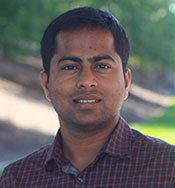Series to Highlight Young Professionals in Signal Processing: Dr. Subhro Das

 This issue brings to you our interview with Dr. Subhro Das, an active IEEE Signal Processing Society (SPS) Young Professional.
This issue brings to you our interview with Dr. Subhro Das, an active IEEE Signal Processing Society (SPS) Young Professional.
We approached Dr. Das with a few questions.
Q. Please provide a brief background about yourself.
I am a Research Staff Member at the MIT-IBM Watson AI Lab, IBM Research in Cambridge USA. The MIT-IBM Watson AI Lab, a first of its kind industry-academic collaboration between IBM Research and MIT, focus on fundamental research problems at the vanguard of artificial intelligence. With this group of researchers and engineers, I work in developing algorithms for distributed learning over multi-agent networks, multi-agent reinforcement learning, accelerated & adaptive optimization, and online learning in non-stationary environments. My research interests are broadly in the areas of AI, machine learning, and statistical signal processing with applications in healthcare and social good.
I am also a Research Affiliate at MIT, co-leading IBM's engagement in the Bridge pillar of MIT Quest for Intelligence. I received my Ph.D. in Electrical and Computer Engineering from Carnegie Mellon University and Bachelors (B.Tech.) degree in Electronics & Electrical Communication Engineering from the Indian Institute of Technology Kharagpur. My Ph.D. dissertation research was in distributed filtering and prediction of time-varying random fields and was advised by Prof. José M. F. Moura. In my leisure time, I enjoy playing cricket, pool, skiing, and going on road-trips.
Q. How does your work affect society?
Over my past 9 years of research experience in academia and industry, I had exposure to a breadth of challenging research problems with pressing societal impact, especially in the healthcare domain. One example is where we implemented a real-time adaptive personalized physical activity advisor that provides patients with predictive support to achieve their daily health goals using time-series data from wearables. This intelligent advisor system for assisting individuals in changing their physical activity behavior has the potential to improve overall health outcomes. In another engagement, we developed a cognitive model to predict program/goal outcomes & intervention effectiveness while generating health behavioral insights for effective and efficient care management solutions. The health outcomes of high-need patients can be substantially influenced by the degree of patient engagement using such cognitive care management solutions.
In my current research on ‘Future of Work’, I am investigating the impact of technology on the skills, jobs, and the labor market. The goal is to build a novel quantitative framework for studying how occupations are evolving in the U.S. labor market and the roles of technology in this transformation. In particular, the tasks required to do certain occupations will change, such that workers will be required to reskill in order to be employed productively. To adapt to continued technological advancements, the development of comprehensive and robust predictive models is crucial to be able to provide guidance to workers, employers, and new graduates on the skills and tasks of the future.
Q. How has your involvement with the IEEE SPS helped you in building your career?
I have been involved with IEEE since 2012 and have been an active volunteer for the IEEE SPS. As a committee member of the IEEE Young Professionals in Signal Processing Committee, I helped in organizing development and networking workshops for attendees in SPS conferences (ICASSP, ICIP, GlobalSIP). Active engagement with the SPS community has provided me the opportunity to share my intellectual expertise, interact and learn from enthusiastic researchers in my field, and expand my professional network.
I am currently serving as an Associate Editor of Transactions on Signal Processing, which gives me an exposure to the state-of-the-art developments in the signal processing area. I am an active reviewer of several SPS journal and conference papers, and, regularly serve as Program Committee Member of SPS conferences. As a practicing statistical signal processing researcher, IEEE provides me the platform to learn the recent developments in the field, and then collaboratively apply & extend those methodologies in my research problems.

